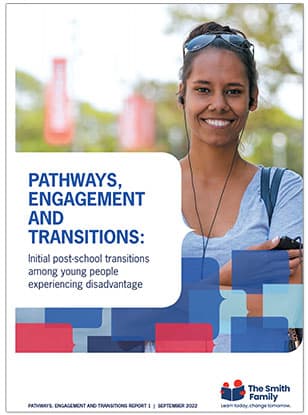
Pathways, Engagement, Transitions: Initial post-school transitions among young people experiencing disadvantage
Giving young people a voice on what they need to succeed post school
Results of a new and ongoing study by The Smith Family are providing direct insights from hundreds of young people experiencing disadvantage on their post-school pathways.
The Pathways, Engagement and Transitions (PET) study is helping to build an understanding of how young people experiencing disadvantage can be better supported with their future careers while they are at school, and during the important post-school transition period.
These include both the enablers and challenges they face to participating in work and further study, as well as the impact of the COVID-19 pandemic.
Data collected through our research
The longitudinal three-year study is following two cohorts of young people across 2021, 2022 and 2023. The cohorts are students who were in Year 10 or Year 12 in late 2020 and participating in The Smith Family’s long-term educational scholarship program, Learning for Life.
The study is collecting a range of data through:
- Three surveys in 2021, 2022 and 2023 respectively.
- Three interviews with a sub-group of 60 young people who completed the survey, in 2021, 2022 and 2023.
- Combining this new data with information collected since these young people began on Learning for Life.
This is the first PET publication and focuses on the young people who were in Year 12 in 2020. It draws on survey responses from over 1,500 young people and 38 interviews. Young people from all states and territories participated in the survey, with 15 percent being from Aboriginal or Torres Strait Islander backgrounds. Just under 30 percent lived in non-metropolitan areas and over a third had a health or mental health condition.


Findings from our research
Young people’s participation in work and study post-school
The majority (75 percent) of young people surveyed were engaged in work and/or study in the year after leaving Year 12. Around half (52 percent) were fully engaged (35 hours a week), and 23 percent were partially engaged (less than 35 hours a week).
A further 18 percent were looking for work, volunteering or working in an unpaid internship or their family’s business. Only seven percent were not participating in any of these activities.
Young people’s patterns of engagement varied across characteristics such as Indigeneity, whether they had a health or mental health condition and their Year 9 English grades. For example, Aboriginal and Torres Strait Islander young people were much more likely than non-Indigenous young people to be participating in work only, and to not be studying.
Over half (53 percent) of all young people in the survey were working and a substantial proportion, including half of those working part-time, would prefer to work more hours. Among those in a job, 39 percent had looked for a new job in the four weeks prior to the survey. These patterns suggest that the jobs that many of these young people are in soon after leaving school are likely to be temporary roles, that ideally serve as stepping stones to others more aligned to their career aspirations.
Of the small group of young people who were not engaged and not looking work, the reasons influencing this included a health or disability issue, they were planning to study, or they lacked the resources to look for work.
The survey highlights a diversity of work and study patterns for young people experiencing disadvantage and these may lead to different longer-term employment and life outcomes.
The data also highlight that early academic indicators such as Year 9 grades are strongly linked to post-school study pathways, but these links are not absolute. There is a substantial minority of students who were struggling academically in Year 9, who are pursuing study post-school.
Enablers to completing Year 12 and transitioning to work and study
Young people identified several factors that helped them decide on, and work towards, their post-school pathway including:
- Support from a range of sources, particularly family and friends, as well as non-government organisations
- Work exposure, VET study and being able to try different career options while at school
- Careers support while at school. Most young people surveyed (86 percent) recalled receiving careers support while at school and just over half of this group (55 percent) found this support helpful

Barriers to successful transitions
Young people identified several barriers to them successfully transitioning post-school including:
- The COVID-19 pandemic
- Limited study and work options in regional areas or for some occupations
- Difficulties in applying for post-school study and being first in their family to undertake such study
- Mental health issues

Conclusions reached through our research
The PET study provides important insights about the factors and circumstances affecting work and study pathways for young people experiencing disadvantage. The first PET Report focuses on their initial transition after leaving school, as decisions and experiences during this time can affect opportunities and outcomes in subsequent years.
On the whole, young people experiencing disadvantage are enjoying this initial post-school transition period, are generally optimistic about their futures, and relishing the independence that comes with moving into work and post-school study. Some feel uncertain about where they are heading or what their next steps might be, particularly when they were trying to work out their goals or dealing with setbacks or health or mental health conditions.
The young people in this study identified several factors that helped or hindered their progression through this period, and tangible solutions that could help young people in future. These included more personalised careers support at school to help young people identify a range of options they might be interested in pursuing, assistance with identifying how to plan for those pathways and the potential application processes involved, and structured exposure to the world of work while they are at school.
These young people were emerging from school and entering this important transition phase during the COVID-19 pandemic, which brought unprecedented and ongoing challenges. Despite the resilience of these young people, the challenges of transitioning from school during a pandemic with far-reaching and deep impacts on educational and labour market opportunities necessitate intensive and targeted support for young Australians experiencing disadvantage. How the pathways of these young people develop over the next couple of years is a key focus of the PET study and will be explored in subsequent publications. This provides a unique opportunity to better understand the dynamics of young people’s pathways and how they might be better supported.

